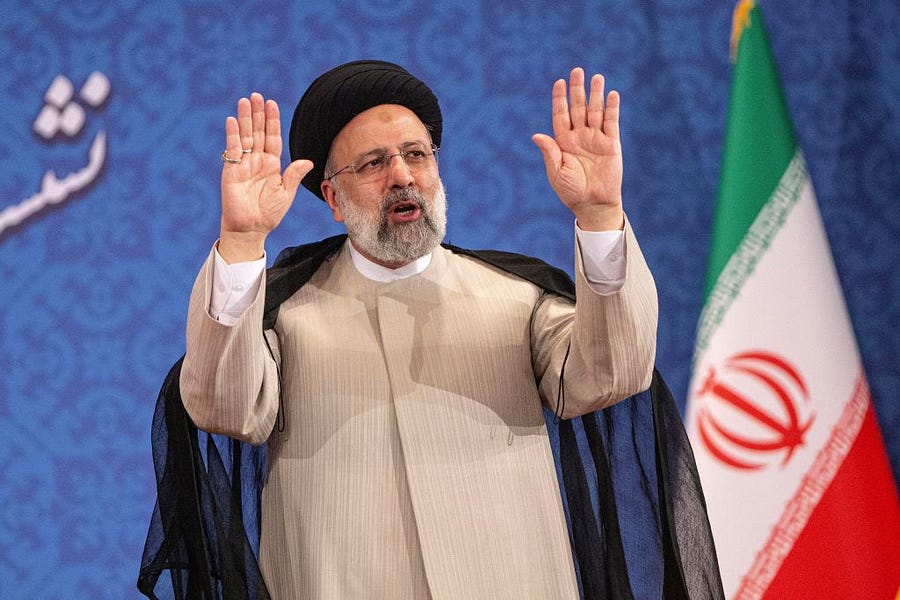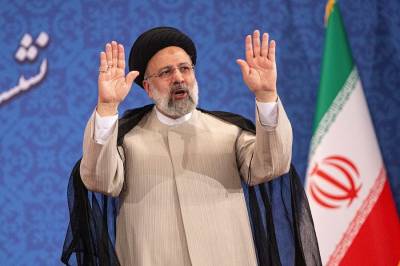Europe’s willingness to accommodate the Islamic Republic continues, and cold geopolitical and economic calculations go far to explain the motivations of its leaders.
European officials seem eager to buttress the regime’s position while turning a blind eye toward the Iranian democracy movement, even in the wake of the election of Ebrahim Raisi, a hardliner involved in the execution of thousands of Iranian dissidents in the 1980s. The European Union has even suppressed demonstrations by Iranian democratic opposition activists at the behest of senior Iranian officials.
European officials have encouraged air travel to Iran and invited known regime apologists to speak before the European Parliament.
The EU has decided to ignore the regime’s human rights violations and regional expansionism, its support for terrorism and development of conventional military capabilities like long-range ballistic missiles, to focus solely on a new Iran nuclear agreement. Simply, the Europeans want a deal so they can invest in Iran again and reap the rewards, including lucrative contracts for European energy companies.
Since the turn of this century, the EU and its members, especially the E3 (France, the U.K., and Germany), base most of their interactions with and their policies on Iran on the ill-fated Iran nuclear deal. Germany’s former foreign minister Joschka Fischer was wedded to a narrow Iran atomic deal strategy in 2003 that relied on carrots rather sticks.
Almost two decades later, European officials still seem eager to court Iranian officials. Take the example of Austrian President Alexander Van der Bellen, who congratulated Raisi last week and received the support of the Alpine state’s foreign ministry. It cannot be ruled out that Austrian economic power politics are driving Van der Bellen’s actions. The Austrian energy giant OMV is likely seeking to jump-start trade deals with Iran.
Sadly, Van der Bellen’s congratulation of Raisi is not an anomaly. Swiss President Guy Parmelin replicated Van der Bellen’s congratulatory note in early July.
In 2019, German president Frank-Walter Steinmeier sent a congratulatory telegram to Iranian President Hassan Rouhani in the name of the German people to honor the founding of the theocratic state. Steinmeier’s Social Democratic Party colleague, Foreign Minister Heiko Maas, has repeatedly sent senior diplomats to Tehran’s embassy over the years to celebrate the 1979 Islamic Revolution.
Maas is currently facing criticism in German media from the daughter of Jamshid Sharmahd, a German citizen who was kidnapped by Iran’s regime in the UAE and faces the death penalty for a crime he did not commit.
Rather than focus on securing the release of two Austrian-Iranians kidnapped by the regime, the Austrian ambassador to Iran has encouraged international flights to that country despite the regime being responsible for intentionally shooting down Ukraine International Airlines Flight PS 752 in January 2020, resulting in the death of 176 people, mostly Iranians and Iranian-Canadians. The ambassador’s actions put the lives of more innocents at risk.
Austrian Foreign Minister Alexander Schallenberg recently received harsh criticism for his alleged passivity from the families of the Austrian-Iranians held in the Iranian regime’s prison system.
Then there is the regime’s decades-long history of assassinating Iranian dissidents on European soil. For the Europeans, a mix of realpolitik and occasional diplomatic slaps, including evicting Iranian diplomats, is largely the modus operandi.
More than 10 Iranian dissidents have been murdered by the regime on European soil, often meeting little reaction or pressure from European capitals toward Tehran. Schallenberg even forced peaceful Iranian demonstrators to leave the area of the Grand Hotel in Vienna where nuclear negotiations are taking place between Iran and members of the P5+1, demonstrating a total disregard for European values of free speech and peaceful assembly
Europe should stop appeasing the Islamic Republic and begin taking notice of important changes taking place in Iran. The EU’s narrow focus on the JCPOA only serves to harm Europeans, Iranians, and all those interested in world peace.
Alireza Nader is a senior fellow at the Foundation for Defense of Democracies, where Benjamin Weinthal is a research fellow.






Please note that we at The Dispatch hold ourselves, our work, and our commenters to a higher standard than other places on the internet. We welcome comments that foster genuine debate or discussion—including comments critical of us or our work—but responses that include ad hominem attacks on fellow Dispatch members or are intended to stoke fear and anger may be moderated.
With your membership, you only have the ability to comment on The Morning Dispatch articles. Consider upgrading to join the conversation everywhere.